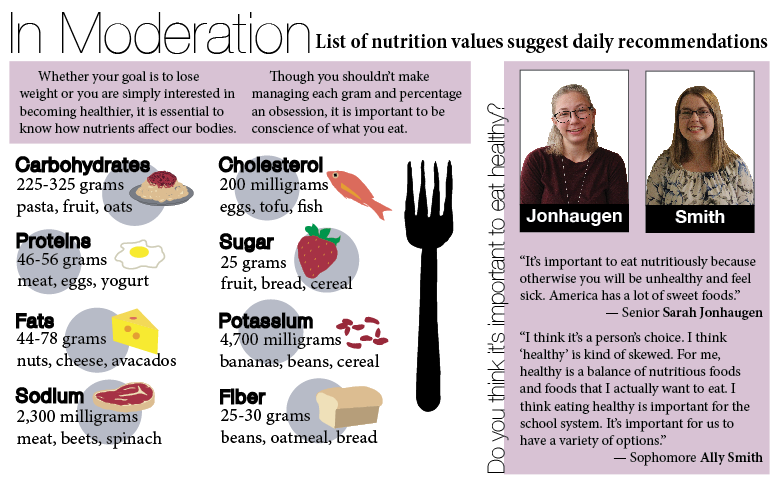In Moderation
Whether your goal is to lose weight or you are solely interested in becoming healthier, it is essential to know how different nutrients affect our bodies’ functions. Though you shouldn’t make managing each gram and percentage an obsession, it is important to be conscience of what you eat.
Carbohydrates
Healthy sources — Pasta, Fruit, Oats
Carbohydrates are our bodies’ main source for energy and fuel for muscle contractions, so they are very important, especially for athletes. If you are often tired — consume more carbs; if you are trying to lose weight — consume less.
Fats
Healthy sources — Nuts, Cheese, Avocados
Fats are a necessary source of energy, as well as a regulator for body temperatures. Unsaturated fats should make up the most of your fat consumption, as they can lower cholesterol. Trans fats and saturated fats should be kept to a minimum as they raise cholesterol levels and weaken memory.
Proteins
Healthy sources — Meat, Eggs, Greek yogurt
If you often feel hungry or are trying to build muscle, eat more protein. Protein builds and repairs body tissue, so it is required for muscle growth. It also keep you feeling full longer, but too much protein can result in dehydration or weight gain.
Sodium
Healthy sources — Meat, Beets, Spinach
Sodium latches onto water molecules and can keep water portions in your body healthy, while helping control blood pressure. However, the average American consumes too much sodium, which can lead to high blood pressure and bloating.
Cholesterol
Healthy sources — Eggs, Tofu, Fish
Cholesterol is an essential component in all animals that enables the body to produce certain hormones, as well as vitamin D. Unfortunately, it’s easy to have high cholesterol levels either from over-consumption or as a hereditary condition, which can risk cardiovascular disease.
Potassium
Healthy sources — Bananas, Beans, Cereal
Potassium is an electrolyte that’s main function in the body is building proteins and muscle. By lowering blood pressure, potassium is also helpful in lowering the chance of having a stroke. Too much potassium intake can result in poor kidney function.
Sugar
Healthy sources — Fruit, Vegetables, Cereal
Sugar, a type of carbohydrate, supplies the glucose your body needs. It is best found naturally and not added to the foods you eat. Too much sugar can lead to health concerns such as diabetes, weight gain, acne and frequent cravings.
Fiber
Healthy sources — Beans, Oatmeal, Whole-wheat Bread
Also a type of carbohydrate, fiber is the only carb that can’t be digested. Fiber balances the body’s sugar use, regulates the digestive system and lowers blood pressure. Too much fiber can cause irregularity or cramping.

Alli Williams is a co-editor in chief for “The Tiger Print.” She works as an assistant teacher at a math tutoring business. Her favorite part of journalism...




